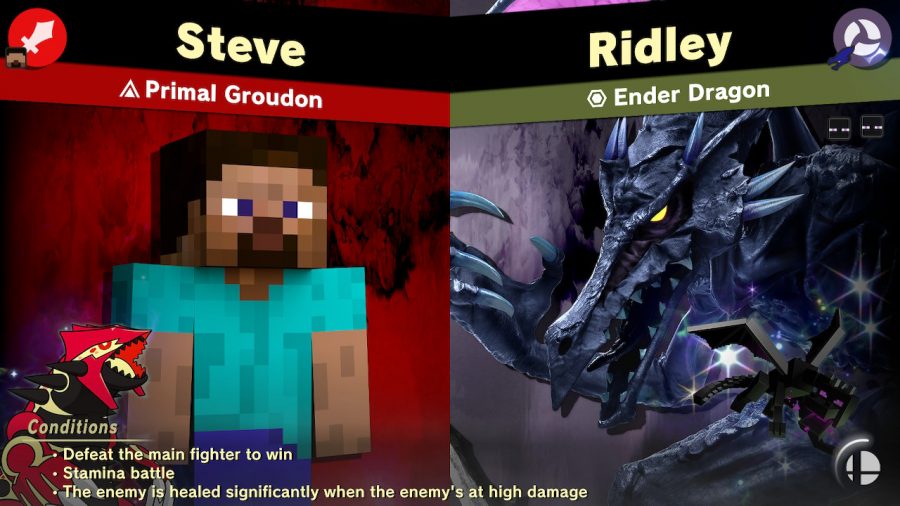Gaming landscape changed in era of pandemic
Steve from Minecraft facing off against the Ender Dragon Spirit in Super Smash Bros. Ultimate.
December 8, 2020
Lockdown is restarting, millions have lost their jobs, people feel further from their family and friends than they have in years, but for many, there exists one reliable escape: video games. While quarantine has driven people apart in the real world, for gamers, it has brought people closer together. Animal Crossing: New Horizons and DOOM: Eternal both released on March 20 to worldwide acclaim, and they acted as the first major game releases of 2020.
Animal Crossing, a game series about caring for and tending to a village of the player’s own design, has never been Nintendo’s cash crop series; yet Animal Crossing: New Horizons sold over 11 million copies in its first two weeks, and currently stands at around 26 million copies sold. This makes it the Switch’s second-highest seller after Mario Kart 8 Deluxe according to Nintendo’s sales projections.
“The game is really relaxing,” freshman Jimmy Moore said. “[Animal Crossing] always finds new ways to make you feel like you’re making progress, which is something we all need during the quarantine.”
Many analysts believe the success of New Horizons is closely tied to the isolated nature of the pandemic, as the games’ collaborative and soothing nature appealed to millions who felt anxious or lonely in quarantine. The control it gave players over their world was a key psychological element of its success as well, according to analysts at the BBC and ScienceFocus.
Animal Crossing: New Horizons continued to gain more and more popularity, even reaching a point where the game was being used to promote political movements and presidential nominees. The game has been used to promote causes like the Bernie Sanders 2020 campaign and the Hong Kong protests.
“It’s like the game is a new mode of communication in a way,” freshman Jimmy Moore said. “The game gave a kind of control to the player that allowed for creativity and unexpected statements about the real world.”
In April, video games were used to simulate another aspect of real-life: concerts. In the popular game Fortnite, they held live concerts featuring Travis Scott and Marshmello.
“It was insanely surreal,” sophomore Airton Ludena said. “I couldn’t go like more than three minutes without seeing advertisements for it, and yet it still didn’t feel like it was ever going to work.”
The concerts aired throughout the month of April and played live to over 12 million people.
Not all change has been considered positive by the community, however. Many in-person events, such as the famous E3 gaming showcase, and tournaments for competitive games like DOTA 2 and League of Legends have been canceled or moved online to varying degrees of success.
One notable example of the controversy surrounding the shift to online was found in the Super Smash Bros Ultimate (SSBU) competitive scene, where fans have expressed disappointment with Nintendo’s handling of their online servers, the frequent lag spikes that left players disconnected and interrupted high-level tactics. Since quarantine began, the hashtag “#fixultimateonline” trended worldwide on Twitter four times.
“The shift was unexpected,” Julian Freeburn said. “It opened our eyes to the major drawbacks that the online experience in Smash had, but it allowed us to innovate the way online tournaments and other events work to accommodate for those drawbacks.”
Freeburn is a professional SSBU player who goes by the name GigaNova online. He has participated in dozens of official online tournaments and has spent time with many professional SSBU Crews. Currently, GigaNova is interviewing to join YoX, a Smash Crew that operates in the northern Virginia area.
Outside of the competitive multiplayer scene, the delaying of big-budget games like Cyberpunk 2077 and Halo: Infinite has allowed for the growth of indie games like Devolver Digital’s Fall Guys, and especially InnerSloth’s game Among Us. It was released in June 2018 to a relatively small audience, but in August 2020, a streamer named Sodapoppin played Among Us on his Twitch Stream and the game blew up overnight, gaining 86 million downloads on the App Store and Google Play Store, as well as 3.8 million on Steam.
Among Us is a social deduction game similar to the party games Mafia or Town of Salem. Players must figure out who in their group is the impostor while the imposter’s mission is to kill everyone before they get caught.
“Playing Among Us has actually brought me closer to friends and people I haven’t talked to in ages,” sophomore Jaeden Persaud said. “It’s allowed me to just hang out with friends, [and] it has allowed me to dust off my critical thinking and analytical skills I haven’t used in months.” This game brought together people from many different corners of the gaming community, most notably creating collaborations between famous social media and youtube icons like Pewdiepie, James Charles, Jacksepticeye and Michael Reeves. The game also found its way into the political sphere, when Congresswoman Alexandria Ocasio Cortez and Rep. Ilhan Omar played Among Us with Disguised Toast, Pokimane, Jacksepticeye and many others in October.
This year has seen some of the largest collaborations, as well as a community more connected than it has been in years due to a surge of multiplayer-focused games that revolve around bringing gamers together. Even in the midst of console wars and lack of public events, social groups with no clear connections have found ways to make friends with one another through the medium of gaming and shared experience.
“It’s really been crazy,” Freeburn said. The transition has “allowed [him] to more easily immerse [himself] in the community and to appreciate the friends [he has] made within it.”



